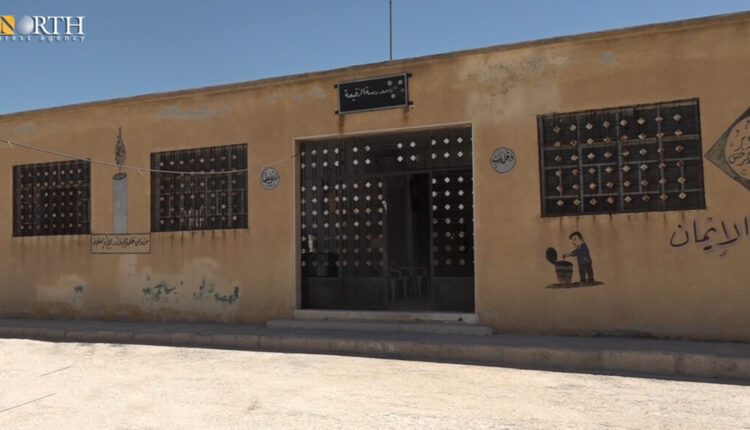
MANBIJ, Syria (North Press) – AsSchools are about to open and preparations for the new school year are continuing, Ahmad feels anxiety and fears for his children because their school is situated on contact lines.
In the village of al-Rafiah (al-Jat), north of Manbij, northern Syria, Ahmad Haj Muhammad said, “When clashes take place, bullets come from everywhere, it does not differentiate between children and adults.”
Haj Muhammad added that their fears increase more as schools are about to open, fearing that shelling occurs during school days, as has happened in previous years.
Areas on contact lines in Manbij countryside successively shelled by Turkish forces and their affiliated armed Syrian opposition factions, known as Syrian National Army (SNA), accompanying infiltration attempts into villages under the control of the Manbij Military Council.
The city of Manbij, east of Aleppo, is one of the most important industrial centers in northern Syria, as it is a transportation hub and sits on a commercial road linking the Autonomous Administration held areas with those of the Syrian government, in addition to opposition-held areas in northern Syria.
The Syrian Democratic Forces (SDF) supported by the US-led Global Coalition to Defeat ISIS liberated Manbij from ISIS in 2016 following fierce battles.
Following its liberation from ISIS, the Arabs, Kurds, Circassians and Turkmen, who constitute the fabric of Manbij, established their own administration under the name of Democratic Civil Administration of Manbij and its Countryside to run the affairs of their region. Then, this administration joined the Autonomous Administration of North and East Syria (AANES).
On September 5, on its official account, Manbij Military Council said that the Turkish forces stationed in al-Kreidiyah base west of Manbij targeted the village of Jabla al-Hamra with mortars.
The council did not elaborate on any material or human losses.
The residents of villages of al-Hoshariya, Umm Adasa, northeast of Manbij, passing by the villages of Sayyadah, Aoun Dadat, al-Yalanli, Dandaliya, Arab Hassan, al-Farat, al-Kawkli, Qarh weran, al-Boghaz, Kor Hiyok and al-Hamra, reaching the villages in Arima district, fear shelling resumes on their homes and schools.
On Sunday, teaching staff began their work in schools in northeastern Syria in preparation for the new academic year, and students are scheduled to attend school on September 18.
Twenty four villages in the countryside of Manbij are located on the contact lines between the Manbij Military Council and the Turkish forces and their affiliated SNA factions.
These villages are subjected to constant shelling.
There are 40 schools in the villages, some of them have more than one school.
Manbij and its countryside include 342 schools, and the number of students is estimated at more than 114.000, according to the Education Committee in Manbij.
Haj Muhammad went further saying that shelling causes panic to the population, especially children.
“Children had got diabetes and Hepatitis because of these fierce clashes that take place here,” he added.
On May 18, the Manbij Military Council announced thwarting of an infiltration attempt by the Turkish-backed SNA factions near the village of Muhsinli, north of Manbij.
The infiltration attempt, which was accompanied by clashes with medium and heavy weapons at one of the Manbij Military Council posts, was thwarted, the council said.
According to the principle of the school al-Rafiah, Suhail al-Sam’o, 500 students are going to attend school this year.
Al-Sam’o pointed out that when clashes occur they are forced to gather students in classrooms far from bullets and shells ” till the clashes end, then we send them back home.”
Fears of the Principle, and those of residents of the villages on the contact lines, have increased after June 29, after the Turkish shelling of the village of Arab Hassan, north of Manbij, killed two children.
He said that children live in fear while in school.
He added, “We hope that our message gets to stakeholders and clashing parties” to spare civilians and schools the risk of clashes.
